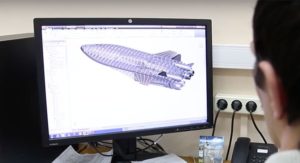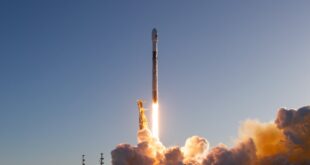
Saudi Arabia is thought to be footing the financial bill for a hypersonic spaceplane concept capable of launching small satellites into low-Earth orbit (LEO) being developed by Ukrainian space company Yuzhnoye, according to Russian space journalist Anatoly Zak writing in Popular Mechanics.
According to Zak citing sources, the Yuzhnoye project is likely more than just a design concept since experimental hardware for the spaceplane design is being developed at Yuzhnoye test facilities in Ukraine.
While neither Yuzhnoye or Saudi Arabia have officially acknowledged the project, Zak’s sources claim that “the unusual “space plane” is actually a partially reusable satellite launcher being developed at Ukraine’s KB Yuzhnoye and Saudi Arabia is covering the bill.”
Saudi Arabia and Ukraine are no strangers to aerospace cooperation, writes Zak, “Ukraine and Saudi Arabia have cooperated on a number of aerospace projects, including the Grom-2 tactical ballistic missile, a scientific sounding rocket, a traditional medium-size satellite launcher, and an anti-aircraft missile.”
Zak reports that the King Abdulaziz City for Science and Technology (KACST) in Saudi Arabia started funding the Yuzhnoye spaceplane project in 2013. The project is a hypersonic craft powered by combination of turbojet and ramjet propulsion acting as the first stage of a two-stage launch capability. According to Zak, the Yuzhnoye hypersonic vehicle’s ramjet propulsion, “will accelerate the vehicle between Mach 4 and 6. Climbing at a steep angle between 40 and 50 degrees, the carrier aircraft will reach an altitude between 25 and 30 kilometers, where the seven-ton expendable rocket will separate and fire its own traditional engine.”
It is thought that the vehicle will be able to launch satellites weighing at least 100 kilograms to altitudes of approximately 500 kilometers.
If the rumour of a Saudi-funded Ukrainian hypersonic space launch vehicle is true, then it indicates Saudi intentions to enter the small satellite launch market along with SpaceX and other players. In October 2017, SpaceWatch Middle East reported that Saudi Arabia had invested in the OneWeb LEO satellite communications megaconstellation and in Sir Richard Branson’s Virgin Orbit, also a competitor for the global small satellite launch market. This also suggests that Saudi Arabia is hedging its bets on several small satellite launch capabilities, and is perhaps also looking to establish its own strategically autonomous launch capability as part of its ambitious economic reforms and its regional power status.
The Yuzhnoye project is not without its challenges, however. Zak reports that Saudi investors and Ukrainian “engineers would have to tackle new problems of propulsion, aerodynamics, and heat-resistant materials. The Ukrainian space industry would also need a large-scale testing and manufacturing base for building full-scale prototypes, airframes, and engines.”





